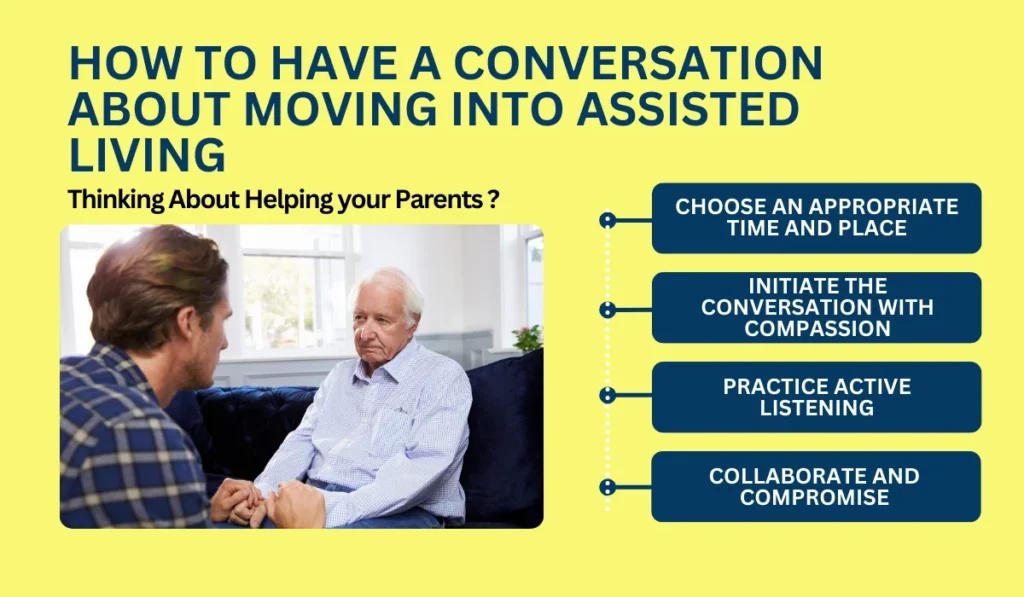As your parents get older and begin to slow down, you might recognize that they need help before they do.
By understanding your parents’ thought process you can (hopefully) determine the best way to help them without making them feel like they’ve given up their independence.
Key Takeaways
- It’s always best to have these difficult conversations before your parents go through cognitive or health decline, especially because some illnesses like Dementia and Alzheimer’s come with symptoms like being disconnected from reality or not thinking logically.
- Offer some back-and-forth and autonomy to your parents. Be open about their needs, but don’t insist on them agreeing with you on everything, and don’t infantilize them.
- Take advantage of resources for elderly Americans and caregivers.
- In some cases, you may be able to invoke the Power of Attorney.
Prioritize Problems and Solutions
Choose your battles. Think about what could be the most pressing issues with your parents’ safety and wellbeing. Prioritize those solutions, and let go of other misunderstandings and arguments.
So that you don’t get overwhelmed, consider making a list of your most important goals, and a list of arguments where you’d be willing to compromise.
For example, maybe your parents don’t need a full-time caretaker, but they do need someone to help them specifically with meals.
Ask Your Parent or Loved One for Help
Part of the adjustment for your parents is that they were once your caregiver, but now you’re theirs.
If you have been trying to convince your parents to either accept home care services or move into a care facility and they haven’t been receptive, then consider sharing your vulnerability with them and ask them to consider it for you.
Let them know that by seeking help, they are also helping you.
Power of Attorney
In more extreme cases, you may be able to get the power of attorney over your parent/parents, which can allow you to make major decisions for them regarding things like finances and healthcare.
Your parent can either voluntarily sign over the power of attorney if they are mentally able to understand the action, or you can file a court petition if they are not mentally able to offer you or other family members the power of attorney.
Get in touch with a lawyer to speak about your options if you feel that this could be a viable route for you.
Be Empathetic and Patient with Parents who Refuse Help
Try your best to remember that getting older is as much an adjustment for your parents as it is for you.
Whether it involves a loss of mobility, driving limitations, or health complications, your parents are going through challenging life changes, too.
Try to be understanding and approach conversations with empathy and patience.
If they can see that you’re making an effort to understand them, they might be more receptive to your requests.
Lean Into Resources
Remember that you are not alone in caring for an older loved-one, even if it can feel like it sometimes, and there are resources like live-in care, financial assistance, government aid, support groups, and more.
Check out Benefits Checkup to see if you are missing out on any benefits for older adults in the U.S. (through Medicare or otherwise) that could help you and your family: https://benefitscheckup.org/
How to Have a Conversation about Moving into Assisted Living

Perhaps you think that assisted living or home health care would be the best option for your parent. If your parent is refusing to go to an assisted living facility, then you have to respect their choice.
However, if their health and safety are an issue, then there are some ways to approach the conversation that might help both you and them.
Choose an Appropriate Time and Place
When it comes to bringing up a conversation about assisted living or long-term care, be sure to choose an appropriate time and place to do so.
Are there other people around? Are you out to dinner at a restaurant? If so, it’s probably best to hold off until you are somewhere more private.
Consider serious conversations you’ve had in the past – what spaces were most comfortable for you?
Initiate the Conversation with Compassion
When heading into a conversation about assisted living or home health care, try not to come in heavy-handed.
Instead, approach the subject with compassion and understanding. If your parent pushes back and you feel yourself becoming frustrated, take a deep breath and try to put yourself in their shoes.
Practice Active Listening
Listen closely to your parent’s responses and consider how they are feeling and what your ultimate goal is. Try not to linger too long on disagreements and focus on the most important needs.
Remember to be intentional about how you listen in that moment. Are you taking time to hear what your parent is saying, or are you thinking about what you want to say while they talk?
If you demonstrate to your parents that you can listen to them, you might find that they are more capable of listening to you.
Collaborate and Compromise
You aren’t talking to your parents because you, and only you, know what is best for them.
Give them options and the chance to disagree with you and make decisions for themselves.
Listen to them and take their feelings into consideration. The first time you bring up assisted living is just to “plant the seed,” after all.
Over time, with multiple conversations like this one, then you can find a solution that works best for both of you.